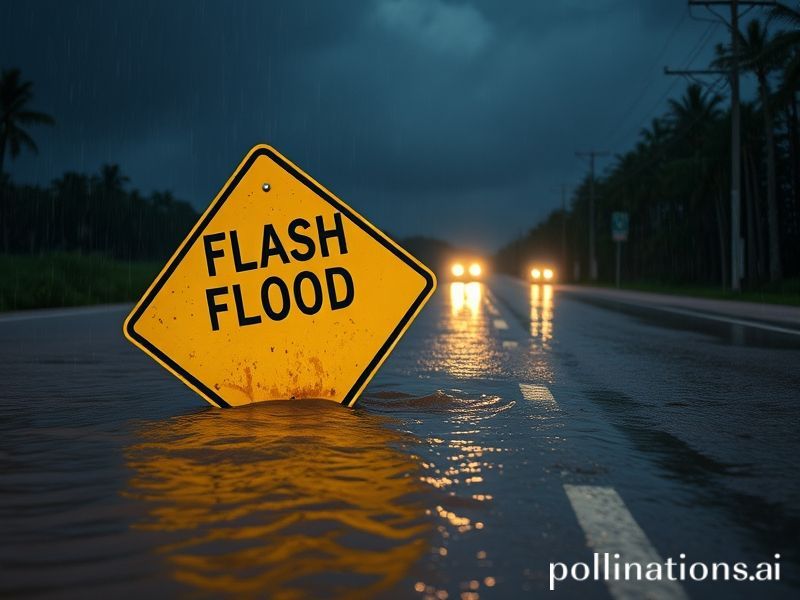Global Flash Flood Warnings: Earth’s Inconvenient RSVP to the Climate Party
Flash Flood Warning: The Planet’s Latest Party Trick
By our soaked correspondent, still wringing out the passport
GENEVA—Somewhere between the 37th climate summit and the 847th “once-in-a-century” downpour of the decade, the World Meteorological Organization quietly upgraded its vocabulary. “Cloudburst” was deemed too quaint, “inundation” too bureaucratic. The new lingua franca is the blunt, all-caps scream of the smartphone: FLASH FLOOD WARNING. It is the same in 87 languages, all of them equally ignored by tourists clutching gelato in downtown Venice or by Texas ranchers who still think “100-year flood” is a Vegas odds line.
From Lagos to La Paz, the script is depressingly identical: radar blinks, sirens howl, someone films a BMW floating past a KFC, and within 24 hours a cabinet minister blames “unprecedented rainfall” while standing ankle-deep in it. The UN calculates that floods now chase 100 million people a year—roughly the population of Egypt—out of their living rooms. Egypt itself, meanwhile, is busy building a new capital city on a desert plateau, presumably so flash floods can discover fresh asphalt to surf.
Global supply chains, those exquisite Jenga towers of late capitalism, are especially water-soluble. Last month a single swollen creek in Malaysia shut down three semiconductor plants, nudging the price of PlayStations higher than the black-market kidneys people were selling to buy them. Over in Germany, the Ahr valley vintners—who once worried about hail—now harvest Riesling with snorkels. Their 2021 vintage is described as “earthy, with notes of diesel and helicopter.” Critics adore it; insurance adjusters less so.
The geopolitics of precipitation is equally entertaining. Pakistan—still paying Swiss consultants to explain why glaciers hate it—has started naming floods after foreign leaders. “Hurricane Biden” submerged a third of the country, but Islamabad graciously accepted a USAID shipment of used FEMA tarps, many still stained from Katrina. China, never one to miss a branding opportunity, now markets its “sponge cities” abroad: permeable concrete that sucks up monsoons and stores them somewhere between the Uyghur re-education camps and the ghost apartments of Evergrande. Investors are invited to wade in—literally.
Europe, meanwhile, has reinvented the ark. Dutch engineers—who else?—have prototyped floating dairy barns so cows can graze atop rising seas while continuing to emit methane at combat-grade levels. The French, never surrendering to good taste, unveiled an amphibious Louvre: Mona Lisa drifts past bemused tourists on a glass barge, her smile now 15 percent more enigmatic thanks to ripples. Italy simply elected a far-right government that promises to deport the floods; initial polling looks damp.
The equatorial belt does not get the courtesy of warnings; there, the sky simply opens like a bar tab at last call. In Uganda, a recent downpour washed an entire wedding party—bride, DJ, and cake—into Lake Victoria. The video went viral under #SinkTheDress, sponsored by a Kenyan life-insurance start-up whose tagline is “We’ve got you covered, even when you’re not.” Shares spiked; nuptials have since moved to Zoom, emcee’d by a priest wearing armbands.
What unites these soggy vignettes is the stubborn human talent for astonishment. We build on floodplains, pave the absorptive earth, then act betrayed when the sky behaves like an alcoholic uncle at Thanksgiving. The World Bank estimates annual flood damage at US $1 trillion—enough to buy every adult on Earth a decent umbrella, which we would still leave in the Uber.
And so the alerts keep pinging, like needy exes we swear we’ll block tomorrow. Meteorologists, tired of screaming into the void, are experimenting with push notifications that simply read, “You know what? Fine. Wear suede.” The death toll climbs, the memes proliferate, and somewhere a hedge-fund manager is shorting galoshes.
Conclusion
Until carbon accounting includes the cost of replacing every basement Xbox and Bangladeshi schoolbook, flash floods will remain the planet’s most democratic prank: no visa required, no wealth exemption, just add water. The warning, increasingly, is not that a deluge is coming; it’s that we are already chest-deep, still arguing about whose turn it is to turn off the tap. Bring floaties.







